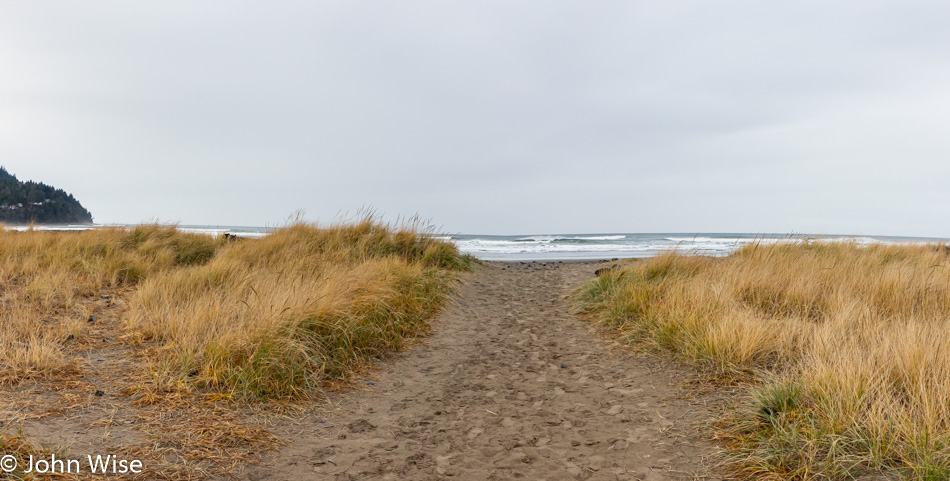
Cannon Beach (not pictured as we were already in Seaside before I took a photo) is where we spent the better part of a few of our previous trips to Oregon and was the starting location for this last day of our visit. With the rain coming down, we skipped the usual beach walk that would take us past Haystack Rock and instead left immediately for Seaside just north of us. This brings up one of the considerations of pre-booking a room, which, unfortunately, is often required on holiday weekends.
Had we woken to nice weather, we wouldn’t have cared about breakfast (and remaining dry) quite so much; we would have started on the beach first thing, and our day would have likely included a walk at Ecola State Park. The premium we paid to be in Cannon Beach would have been justified for our convenience of doing more with the short day under sunny skies. Instead, we incurred an extra $70-$90 for our room but have nothing else of value for putting our heads down here. So it goes, and like all things on vacation, we have to negotiate the variables.
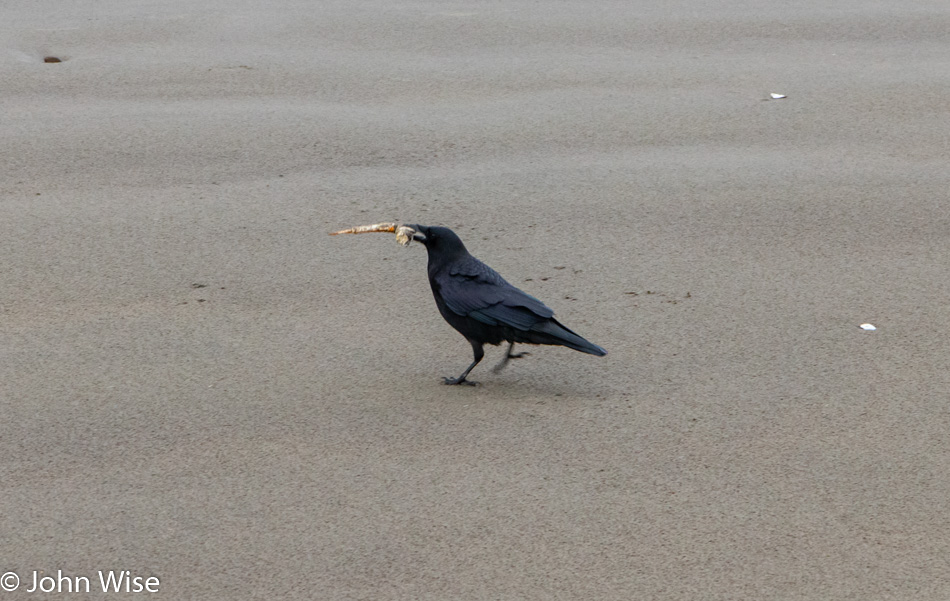
While it may well be a gray day for the remainder of our time out here, we must consider what we’ve heard about the freeze the rest of the country is experiencing and even take note of the snow blanket on the mountains just east of us. Being lucky enough that we can take this short walk between rain showers makes things quite okay. Three tornadoes touched down in Phoenix a couple of days ago, one of them only about 5 miles away from where we live. The Grand Canyon had blizzard-like conditions, losing electricity and heat, all of this while we walked the seashore with nary a care.
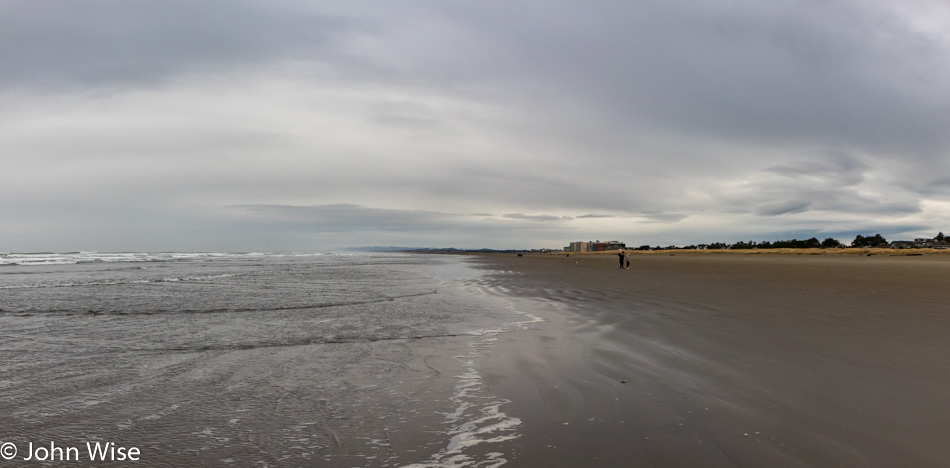
The photos so far are of the beach in Seaside and were taken after our interesting breakfast at the Osprey Cafe. The wait for a table was well worth it as I can say I’ve never had Nasi Goreng for breakfast; it was even topped with an egg, making it especially breakfasty. While I’m at it, Caroline opted for Huevos Rancheros with a kind of corn cake called arepas. We’ll be back.
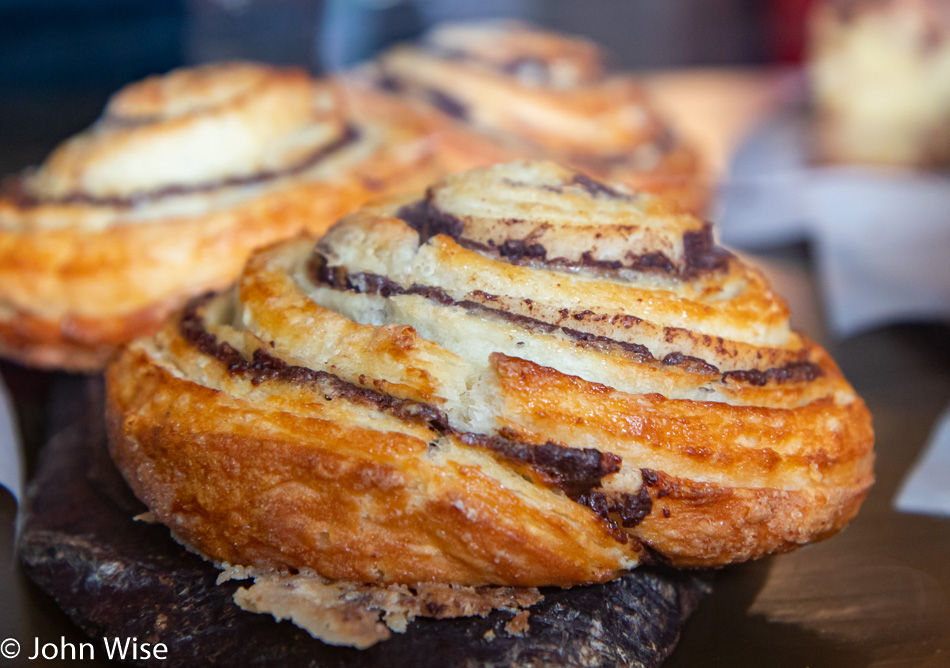
It was starting to rain again as we finished our walk for the short drive to the intersection of Broadway and Holladay Drive and a return to the Beach Books store. Last year, we met Alexa, who we learned yesterday is working today. The Seaside Yarn and Fiber store is two doors down, and in between is the Dough Dough Bakery with hot coffee, free WiFi, and some excellent baked goods. After talking books for a time with Alexa, I headed into the bakery to catch up on some very neglected blogging chores.
Armed with more coffee and willing to suffer greater indulgence for the sake of allowing me to extol the virtues of being fully on vacation where the senses should always be operating at full capacity, I had a cinnamon roll. What’s the big deal? It’s just a pastry, right? Not to a person with diabetes; it’s evil incarnate and promises to spit on my cells that cannot absorb any more glucose. More insulin is the solution, you say? Not in my world where exercise, diet control, and Metformin have been able to keep things in check. This form of hedonistic debauchery in the realm of culinary sweets is tightly controlled, but not on vacation, as that would be torture.

Let’s pretend this is just a normal day and that we live here in retirement. This raises my ire as it brings up what is broken with Oregon beyond the clearcutting of forests and overfishing: the cost of real estate. Wealth from outside the area has moved in on the coast, buying up property for vacation homes and investments, thus driving up the cost of real estate for everyone else. You need not point out that this is the norm in cities across America, allowing the wealthy to earn more from their already concentrated wealth. Combine the rising cost of a dwelling, be it a rental or purchase of a home in places with relatively depressed economies where most people make something under $15 an hour, and you have a recipe for pain.
The idea that we could rent a place in northern Italy cheaper than we can two miles inland in Florence, Oregon, strikes me as a horrible deal that doesn’t bode well for the local economies up and down the coast here. Instead of Caroline and I leaving our savings here in Oregon, we’ll likely be spending them across the Atlantic, where our cost of living will be more manageable. What justifies these extraordinary inequalities where a small cadre of wealthy people are able to bring financial ruin to so many? These actions drive the people of lesser means out of the region into bigger cities, but their lack of formal education relegates these transplants to menial jobs. I guess this is one way to curtail Hispanic immigration.
This is not a win-win situation for anyone unless the wealthy, who are displacing the residents of this coastal region, believe their working-class minions will commute 20 to 70 miles from points inland to take the jobs of serving them lattes and walking their dogs. As I write this, I want to blurt out that I think this is just plain old fucked. Maybe you are suggesting I do something about it? Well, what does one do in a country where mediocrity and acceptance of a distorted and broken status quo rule the day? Ayn Rand, with her idiotic Fountainhead and Atlas Shrugged, was wildly successful in bringing us to a pure version of survival of the fittest, which has translated into everyone out for themselves and be damned those of you who can’t keep up. To this end, I don’t feel we are any longer Americans except when someone asks us for our hopes and prayers, to stand for the national anthem, or somebody brings up soldiers and their sacrifices.
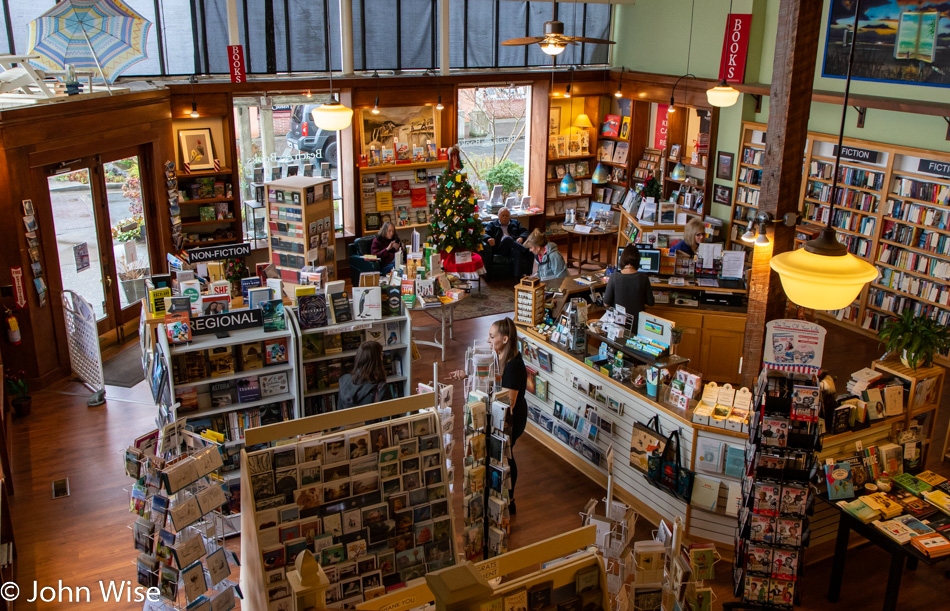
Out of the bakery and back to the bookshop. This being Sunday, the bakery closes early at 1:00 p.m. due to business fading after the rush of people leaving church services. At the last minute, Caroline decided she really liked the Dough Dough Bird t-shirt too much to let it go, so we have one more item to pack tonight.
It looks like we might have another book or so coming home with us, including The Triumph of Seeds: How Grains, Nuts, Kernels, Pulses, and Pips Conquered the Plant Kingdom and Shaped Human History by Thor Hanson that Alexa inadvertently brought our attention to. She also let us leave with Me and Mr. Cigar by Gibby Haynes of the Butthole Surfers and The Adventurer’s Son: A Memoir by Roman Dial. These two last titles are not due out until next year; lucky us. These would join yesterday’s findings with 1491: New Revelations of the Americas Before Columbus by Charles C. Mann, SPQR: A History of Ancient Rome by Mary Beard, and Sometimes a Great Notion by Ken Kesey.
The Ken Kesey book was recommended to us down south while at the Siuslaw Pioneer Museum in Florence due to our interest in the historic industrial side of Oregon and how its past is crashing into the reality of the present. While I thought there was a small chance we’d find this title up here in Seaside, I was surprised that they’d have a title that is 42 years old, even if it is about Oregon.
This makes me wonder about resource depletion going on 100 years ago and how the wealthy are depleting the working class today by harvesting every penny they can from them through owning their homes and apartments and wrecking their participation in acquiring a quality life for themselves. But who cares about the unwashed masses who made their bed and are now being forced to sleep in it, right? I care because Caroline and I could easily be priced out of our vacations. Right now, we are privileged to have the means to bring ourselves into these kinds of experiences and are well aware of the fact that the majority of people along this coast do not have the ability to take themselves even down to Arizona, forget about the expense of heading to Europe for a few weeks.
Moss is allowed to live a better, more symbiotic life here on the coast, where, from its vantage point near the ocean, it lives free. Its descendants inherit its place tax-free and do not require an expensive university education to make a living. The birds take a place on the beach or on a tree branch when not darting about the sky without a license or rules they have to follow as they travel freely on their quest to find food along the way. Only when humans come along to displace their habitats do these creatures and plants find their existence threatened.
I’ve probably made this exact lament at least one other time here on my blog, but I feel it bears repeating. I’m supposed to feel free. To the extent that Caroline and I have the education and economic ability to bring ourselves into these adventures, I certainly feel lucky, but I also appreciate that so many more people in Europe have the same opportunities and means to share in the extraordinary. I attribute this perceived disparity to giant differences in health, education, and business practices in Europe that have at least some bias favoring the common individual. Europe’s population is twice that of America’s, and yet they can afford free university, great public transportation, and a humane amount of paid vacation for the individual to find a quality of life that better justifies the sacrifices made for the state and for big business.
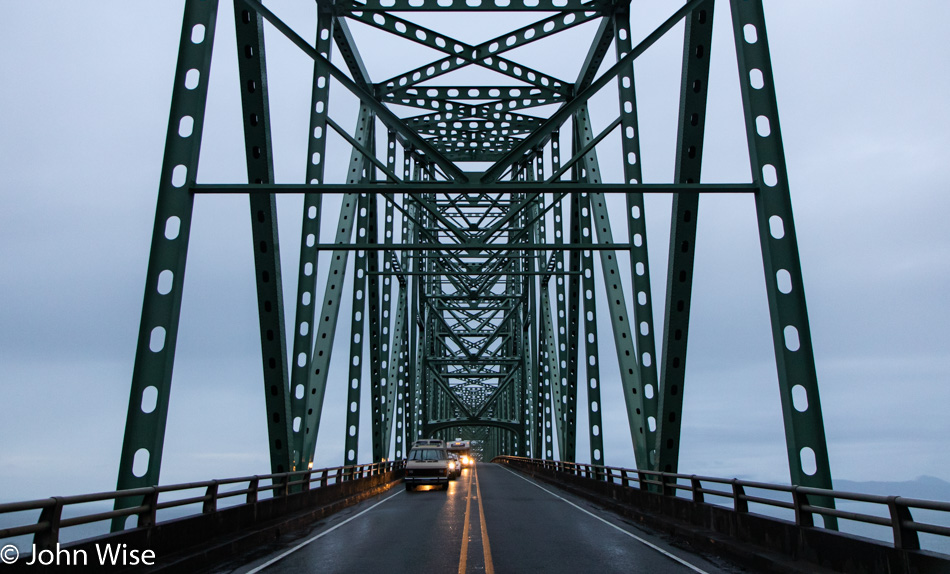
Bridges are interesting in regard not only to transportation but to human endeavors, too. In practice, they make moving between two geographical points easier, saving us time and allowing us better access to things and people that might otherwise be out of reach. In society, we use bridges as part of our social networking, which is supposed to offer us access to opportunity, but as we become electronic shadows of our former selves, we are increasingly irrelevant as part of the intellectual highway system. In that sense, it’s as though this bridge over the Columbia had been built for birds that would just fly from shore to shore. So why is this human-to-human bridge failing?
Is it because of our dismal view of one another? Is it because we no longer feel like an integral part of a larger thing and instead are isolated electrons in orbital positions around a nucleus of the ego existing in a void? Are we nothing more than a transaction with an IP number moving about like some anonymous packet of data? While hydrogen and oxygen are almost inextricably entangled in a water configuration, it is as though we humans are on a path towards oblivion, believing we can be on our own alone in a universe where the execution of financial transactions is the apex of being. Community and belonging to a larger something is going extinct.
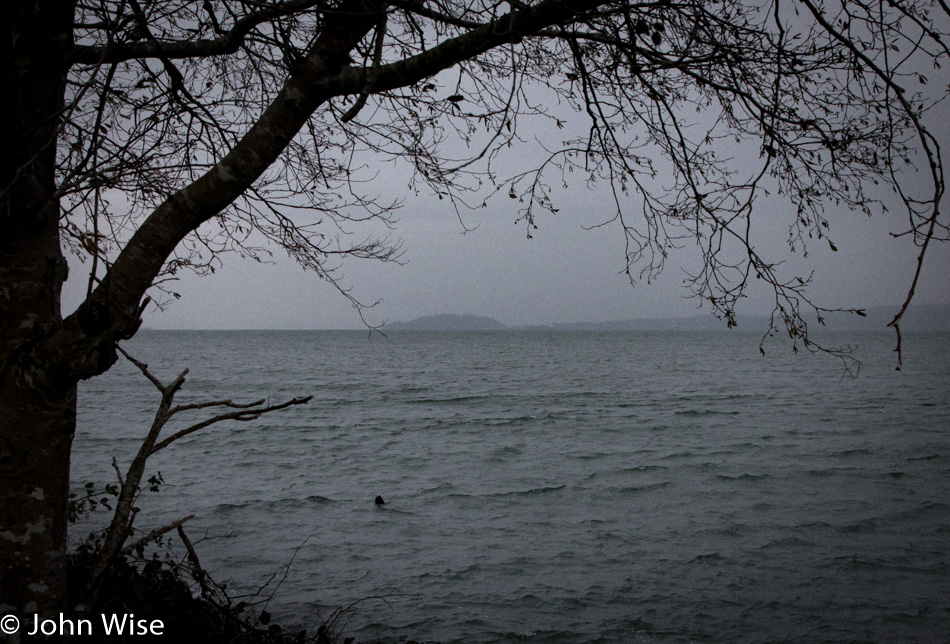
Our act of becoming nothing was being recognized by the early 1980s as Gilles Deleuze and Felix Guattari were writing about our deterritorialization in the book A Thousand Plateaus. In the ensuing years, we’ve accelerated the process and broken free of all territories on our way to full dematerialization. While those authors were seeing the hints of losing cultural meaning they could never have predicted that the personal electronic economy would not only remove any vestige of personal territory but that it would reject the physical existence of the individual.
As we become electronic puppets on the stage of parody where consumerism has replaced survival, we no longer have a need to be human in the sense that we are an evolutionary species seeking meaning. In another age, we learned to brave the elements, were taught about our environment, we sought symbiosis with a hostile world. Becoming nothing more than information, are we casting the die that suggests that without meaning, the course of evolution may have little need of us?
In an otherwise symbiotic system where death and growth found balance, maintaining relative harmony, we humans discovered ways of subverting nature while destroying our life support system. Simultaneously, we have been dispatching culture and turning ourselves into binary anonymity. Where we used to be a family, community, town, village, state, or country, we are quickly approaching that of being nothing.
Not that any of that really has relevance here, as the larger issue is why we ever believed that the proliferation of information was going to act as a great equalizer by making the wider distribution of knowledge something empowering. Greater access has had the contrary effect in exposing the depth of the individual’s proclivities towards debased idiocy. Collectively, we pander to the lowest common denominator in the name of individual choice under the guise of freedom. We are bullshitting ourselves at the expense of our continued existence but are rendered too narrow-minded to understand our predicament. A dismal situation indeed.
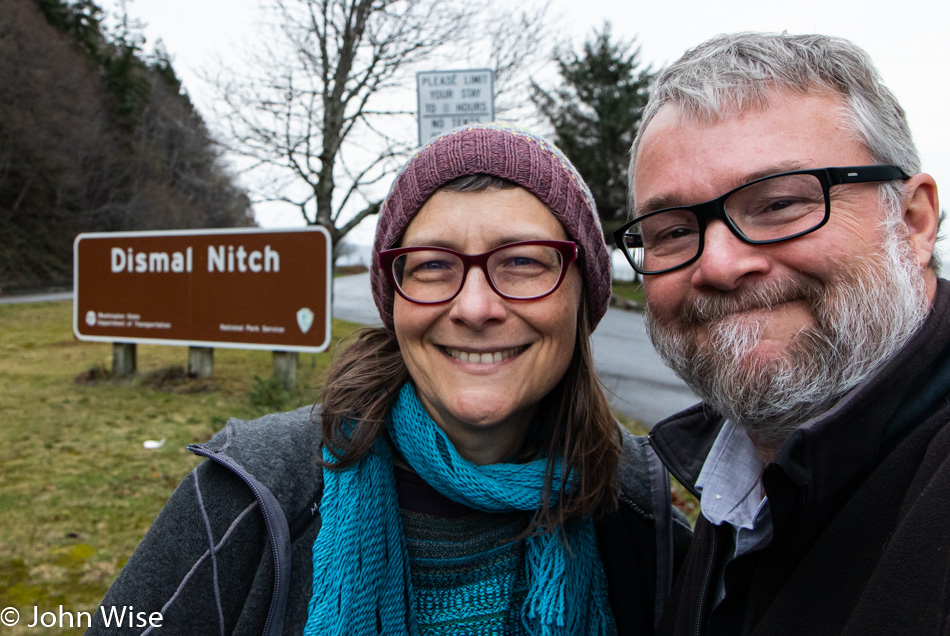
Caroline’s and my situation, on the other hand, is anything but dismal when I consider that we have options, can travel, read, write, explore our minds, develop skills, and contemplate the deeper corners of the ocean, the cosmos, and our emotions I realize our inventory of wealth is overflowing. We continuously try to build bridges with everyone and everything we encounter. While I have embraced our deterritorialization on a path to better knowing our world without any personal allegiance to any particular state, we are at the same time cultivating a global reterritorialization where we work to develop a kindred spirit with everyone. Our path doesn’t see us fading into dematerialization and nothingness as we do not lead a passive life of observation but are out here trying to find the things we do not know, understand, or fully comprehend. On occasion, we stumble into the profound and magical, dressed in moments of love that bring sunshine to the most dismal of days.